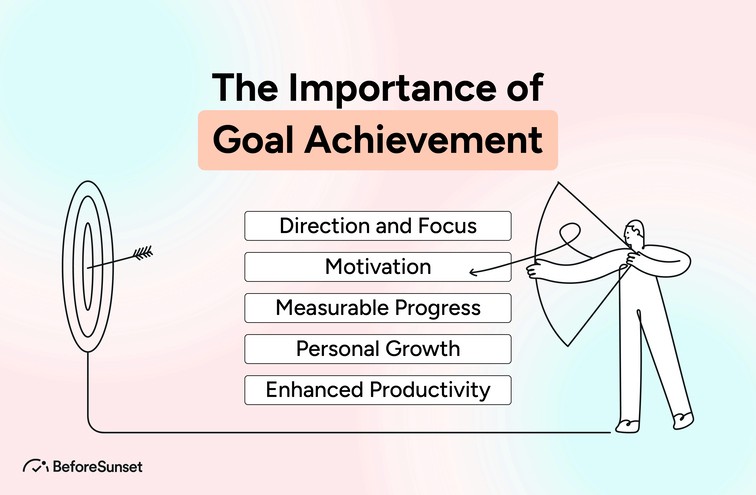A key component of development and success, goal achievement is significant in many aspects of personal, professional, and organizational life. Objectives function as directing lights, offering guidance, meaning, and a path forward for both people and things.
The process of creating and achieving objectives supports motivation, focus, and ongoing development. These benefits can be seen on both a large and personal level, such as in the case of organizational milestones or personal aspirations.
Reaching goals pushes people beyond their comfort zones, building resilience in the face of difficulties and developing an adaptable and persistent attitude. Furthermore, achieving goals not only denotes success but also fosters a sense of fulfillment, which raises self-esteem and improves general wellbeing.

Guilford Press and Positive Psychology
Guilford Press has been instrumental in the advancement of Positive Psychology via the publication of significant publications by esteemed academics and practitioners in the field.
Because of these books, there is a greater knowledge of how people might live more fulfilling lives, which makes Guilford Press an invaluable resource for anybody interested in the relationship between psychology and human well-being.
What Is Positive Psychology?
A subfield of psychology known as "positive psychology" is dedicated to examining and advancing the positive facets of life, happiness, and personal fulfillment. Positive psychology investigates elements that lead to a meaningful and fulfilling existence, in contrast to conventional psychology, which frequently treats mental health issues and dysfunction.
It looks at joyful feelings, personal qualities, activity participation, the search for purpose, and wholesome connections. With the goal of improving overall life happiness and furthering our understanding of optimal human functioning, the area places a strong emphasis on the growth of human strengths and virtues.
Positive psychology is an important and prominent approach within the larger field of psychology because it has practical implications, such as therapies and methods to enhance mental health and encourage individual and societal well-being.
The Role of Guilford Press in Positive Psychology
Guilford Press has contributed significantly to the advancement of positive psychology by publishing important and high-caliber publications in this discipline. Reputable academic publisher Guilford Press has given top researchers and practitioners in the field of positive psychology a forum to communicate their findings, theories, and useful advice to a worldwide readership.
Guilford Press's Positive Psychology books serve as a bridge between scholarly research and practical applications, fostering continuous discourse and advancement in the field.
Numerous themes within Positive Psychology are covered in the books and journals published by Guilford Press, such as research on positive emotions, character traits, resilience, well-being, and interventions to improve people's lives.
Through the publication of these books, Guilford Press has contributed to the best practices and knowledge in Positive Psychology to be shared with academics, educators, mental health professionals, and the general public.
Furthermore, by encouraging original and ground-breaking research in the field, Guilford Press has probably contributed to the development of the conversation around positive psychology.
The works published by Guilford Press add to the body of evidence supporting Positive Psychology methods and applications, impacting not just academic research but also real-world strategies for enhancing well-being.

How Does Positive Psychology Relate to Goal Achievement?
Goal achievement and positive psychology work hand in hand. Positive psychology's tenets provide insightful guidance and practical tactics to improve the process of creating and achieving objectives. The following are some ways that goal accomplishment and positive psychology are related:
Strengths-Based Approach: The focus of positive psychology is on recognizing and utilizing personal strengths. People are more likely to feel fulfilled and motivated when their goals are in line with their beliefs and skills. Acknowledging and capitalizing on one's abilities may boost self-assurance and perseverance when pursuing objectives.
Positive Emotions as Motivators: Positive psychology acknowledges that positive emotions like joy, excitement, and optimism have the ability to motivate others. Developing a pleasant emotional state can help increase motivation and perseverance, two important qualities while pursuing difficult objectives.
Emphasis on Well-Being: Positive psychology places a strong emphasis on holistic well-being, taking into account aspects other than success. In line with the tenets of positive psychology, goals that enhance general well-being, life satisfaction, and a feeling of purpose help people lead more balanced and meaningful lives.
Goal Setting and Engagement: The idea of "flow" in positive psychology, which is defined as intense concentration and pleasure in an activity, has application to goal-setting and engagement. A state of flow is more likely to occur when people set objectives that are beyond their current skill level, which improves concentration and productivity.
Resilience in the Face of Setbacks: Resilience is a skill that positive psychology promotes as a way to deal with obstacles and setbacks. An optimistic outlook can support adaptive coping mechanisms, which enable people to overcome setbacks and remain dedicated to their goals in the face of adversity.
Meaning and Purpose: Discovering one's life's purpose and meaning is crucial, according to positive psychology. Since they lead to a greater sense of contentment and satisfaction, goals that are in line with a sense of purpose are probably more enduring and inspiring.
Positive Relationships: A fundamental component of positive psychology is establishing and preserving positive connections. In order to attain goals, social support may be quite important. It can offer motivation, responsibility, and a feeling of community that makes the process of pursuing goals more enjoyable.
Types of Goals and Their Effectiveness
An essential component of both professional and personal development is goal-setting and pursuing since it offers a path toward progress and accomplishment. The kinds of objectives people decide to pursue are one of the many elements that affect how effective goal-setting is.
Comprehending the distinct classifications of objectives is imperative in customizing tactics and methods to optimize achievement. Objectives, whether they are broad or specialized, personal or professional, short- or long-term, strong motivators that influence behavior and results.

Performance Goals
Performance goals are particular targets that people or organizations establish in order to improve their general productivity and effectiveness. These objectives, which are usually quantifiable, center on developing abilities, reaching particular results, or raising performance across the board.
Performance objectives are common in both personal and professional settings, giving people or teams a framework to work toward achievement and ongoing development.
Employees in a professional context frequently set performance targets that correspond with the aims of the company. These objectives might include hitting sales targets, improving client happiness, finishing tasks on schedule, or picking up certain abilities needed for their positions.
Performance objectives related to professional growth, such as earning a certification or assuming leadership roles, are also possible.
Challenging Goals
Ambitious goals that push people or organizations to work harder and perform at higher levels than they already do are referred to as challenging goals. These objectives, which are meant to stimulate motivation, encourage creativity, and promote excellent performance, are purposefully made challenging yet reachable.
Higher levels of performance are frequently linked to challenging goals because they force people or teams to step outside of their comfort zones and aim higher.
Effective Goals
Well-crafted and strategically planned objectives that result in good outcomes are known as effective goals. They are clear, stating exactly what must be done; they are quantifiable to enable objective evaluation; they are reachable to encourage motivation; they are pertinent to the larger goals; and they are time-bound to create a feeling of urgency.
Sufficient objectives correspond with more comprehensive individual or group tactics, guaranteeing that endeavors make a substantial contribution to the overarching purpose. One essential quality is flexibility, which enables adaptability in the face of shifting conditions.
These objectives provide people or groups a strong feeling of direction and inspiration. Frequent review and feedback are essential for enabling changes and ongoing progress.
Effective objectives provide an organized and intentional framework for accomplishment in organizational, professional, and personal contexts when they are backed by well defined action plans.

Achievement Goal Orientations and Theories of Goal Setting
Theories of goal setting and achievement goal orientations are fundamental to comprehending human motivation, performance, and success in a variety of contexts. These ideas explore how people go about doing things, have goals, and aim for perfection.
Goal orientations for achievement examine the fundamental reasons behind people's actions and divide them into two categories: learning or mastery goals, which are concerned with gaining information and abilities, and performance goals, which are concerned with proving one's worth or surpassing others.
At the same time, goal-setting theories offer a thorough framework that highlights the significance of relevance, measurability, and specificity in goal creation.
Achievement Goal Orientations
The cognitive frameworks and motivational orientations that people adopt when working on tasks and pursuing objectives are referred to as achievement goal orientations. Individuals' conduct, perseverance, and general performance are shaped by these orientations, which also affect how they view and handle accomplishment circumstances.
The two main types of accomplishment goal orientations that are frequently researched are performance goals and mastery (learning) goals.
Mastery (Learning) Goals:
Learning objectives related to mastery: learning objectives center on gaining expertise, refining abilities, and learning new tasks. Those who have a mastery attitude are motivated by a desire to advance themselves.
They value the learning process more than the final product, seeing setbacks as chances to grow competent. The focus is on mastering the current work, and people who have a mastery orientation are more likely to be resilient, curious, and to see effort positively.
Performance Goals:
In contrast, performance objectives center on proving one's abilities or surpassing others. People who are performance-oriented are driven to demonstrate their skills, receive positive feedback, or stay out of trouble.
This attitude might show itself as a concentration on doing better than classmates, getting good marks, or getting attention from others. Performance objectives might help with short-term success, but they can also make people choose simpler activities or dread failure.
Studies indicate that people might have a mix of performance and mastery orientations, creating unique profiles of their desired outcomes. Depending on the situation and the prevailing orientation of the individual, various orientations can have different effects on learning, perseverance, and success in general.
Types of Achievement Goals
1. Mastery (Learning) Goals:
Task Mastery: People with a task mastery goal orientation want to increase their competence and comprehension by concentrating on learning new skills and mastering tasks.
Intrinsic Motivation: People with intrinsic mastery objectives are motivated by the intrinsic gratification of mastering a topic or skill. These people are driven by internal motivations, such as the joy of learning or personal progress.
2. Goals for Performance:
Performance-Approach Goals: People with performance-approach goals aim to succeed in order to be recognized or receive rewards. They are centered on surpassing others or receiving favorable evaluations.
Performance-Avoidance Goals: People with performance-avoidance goals try to avert adverse assessments and may select tasks that reduce the danger of failure. They are driven by a desire to avoid failure or negative judgments.
Blending of Objectives:
Approach-Prevention Objectives: People can display a mix of performance and mastery goal orientations, aiming for achievement (approach) and steering clear of failure (avoidance). A more intricate motivational profile may result from this.
Socially Mandated Objectives:
Social Approval Goals: People with socially prescribed objectives are motivated by a need for social acceptance and approval. They look to others for validation and recognition, which shapes their conduct to fit social norms.

Measuring Progress Towards Attaining Goals
Effective goal management requires tracking progress toward objectives in order to give both individuals and organizations insightful information about their path to success. Measuring development in a concrete and impartial way is possible using quantitative measures.
These might comprise key performance indicators (KPIs) pertinent to the particular objective and numerical objectives like sales quotas or project completion schedules. People may evaluate their progress and decide on their tactics by setting up precise and quantifiable standards.
When assessing development, qualitative evaluations are just as important as quantitative indicators. Frequent self-reflection enables people to reflect on their personal development objectives, taking into account their areas of growth, knowledge, and skill acquisition.
Getting input from peers, mentors, or superiors provides an outside viewpoint that enhances the comprehension of development, especially when it comes to leadership or interpersonal objectives.
Using milestones and checklists provide an organized method for monitoring advancement. In addition to providing a visual depiction of progress, breaking down bigger objectives into smaller, more manageable tasks and acknowledging little victories along the way aid in maintaining motivation and attention.
Timely reviews enable a thorough assessment of strategies, making modifications as needed to keep in line with the overall goals. They can be carried out on a regular basis or in reaction to particular project phases.
These days, measuring goals involves a lot of technology. Real-time monitoring systems, data analytics tools, and project management software allow individuals and teams to monitor progress, spot patterns, and act quickly with well-informed judgments.
When conducted at key junctures in the goal pursuit, surveys and evaluations yield both quantitative and qualitative data, providing a more thorough insight of the efficacy of tactics and areas that may need improvement.
Achieve Your Goals Easily With BeforeSunset AI
Achieving your goals is made simpler with BeforeSunset AI. It offers you a convenient and organized way to manage tasks and stay on track. It also has a user-friendly interface for creating daily to-do lists, setting priorities, and scheduling activities.

